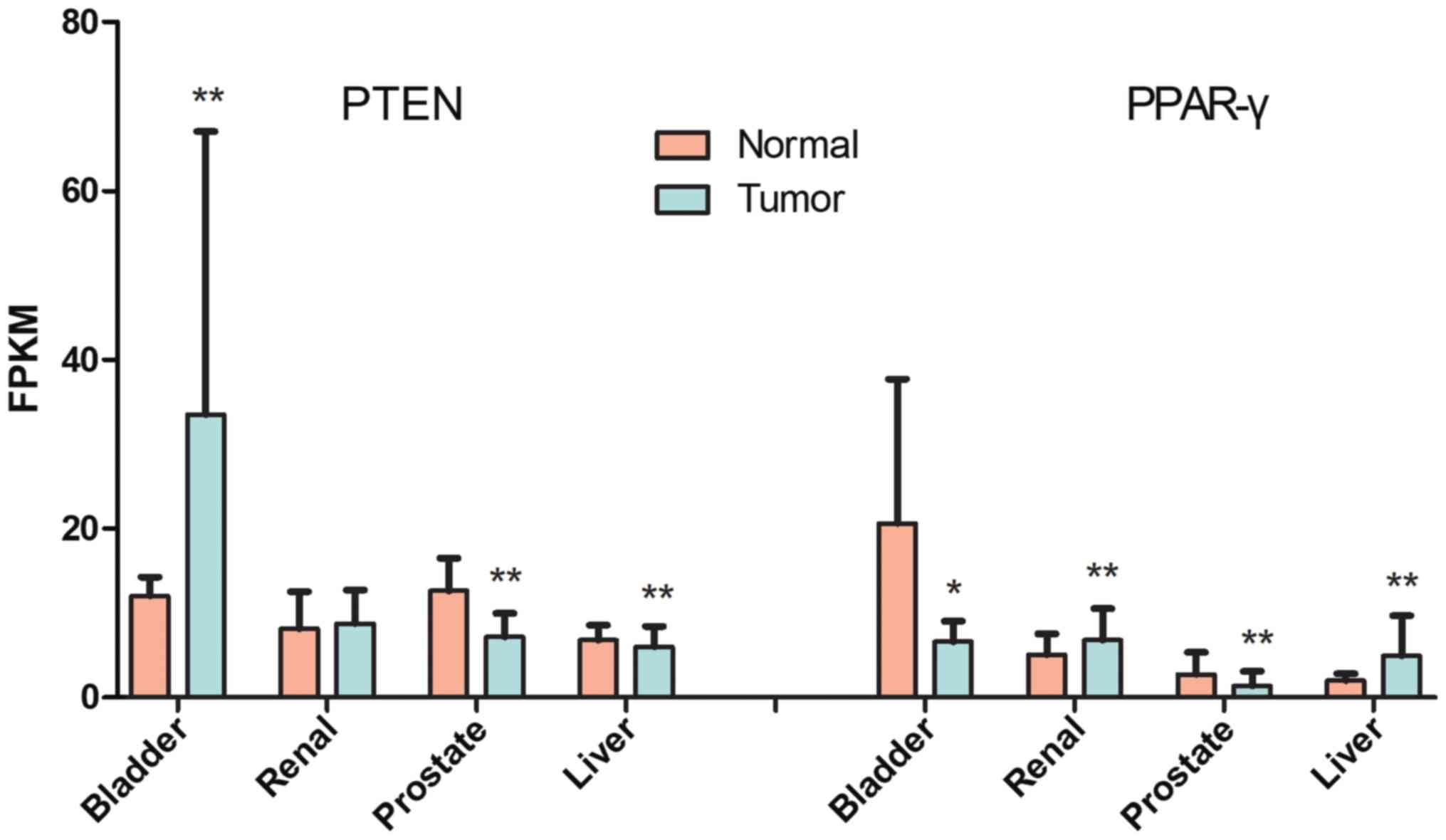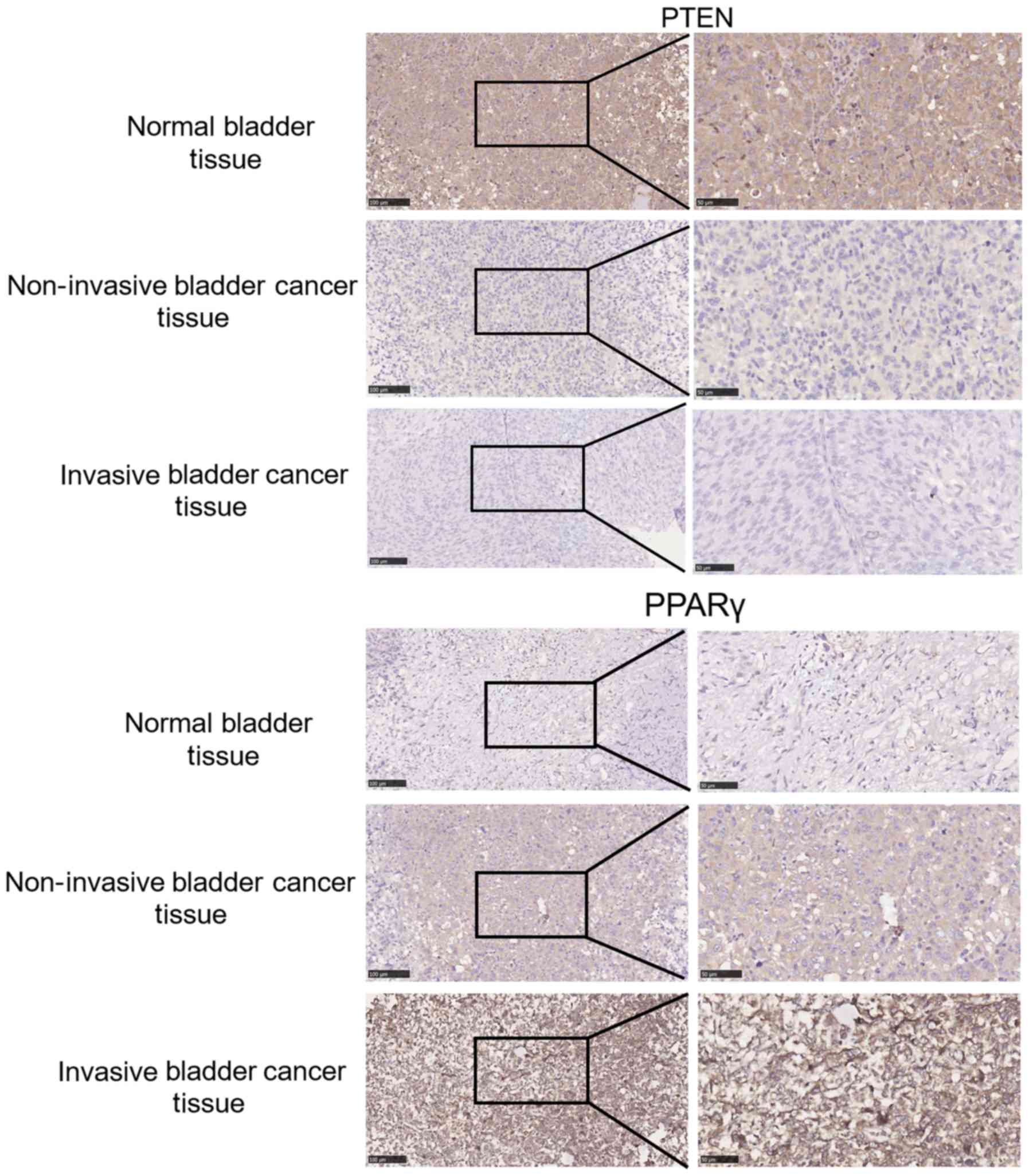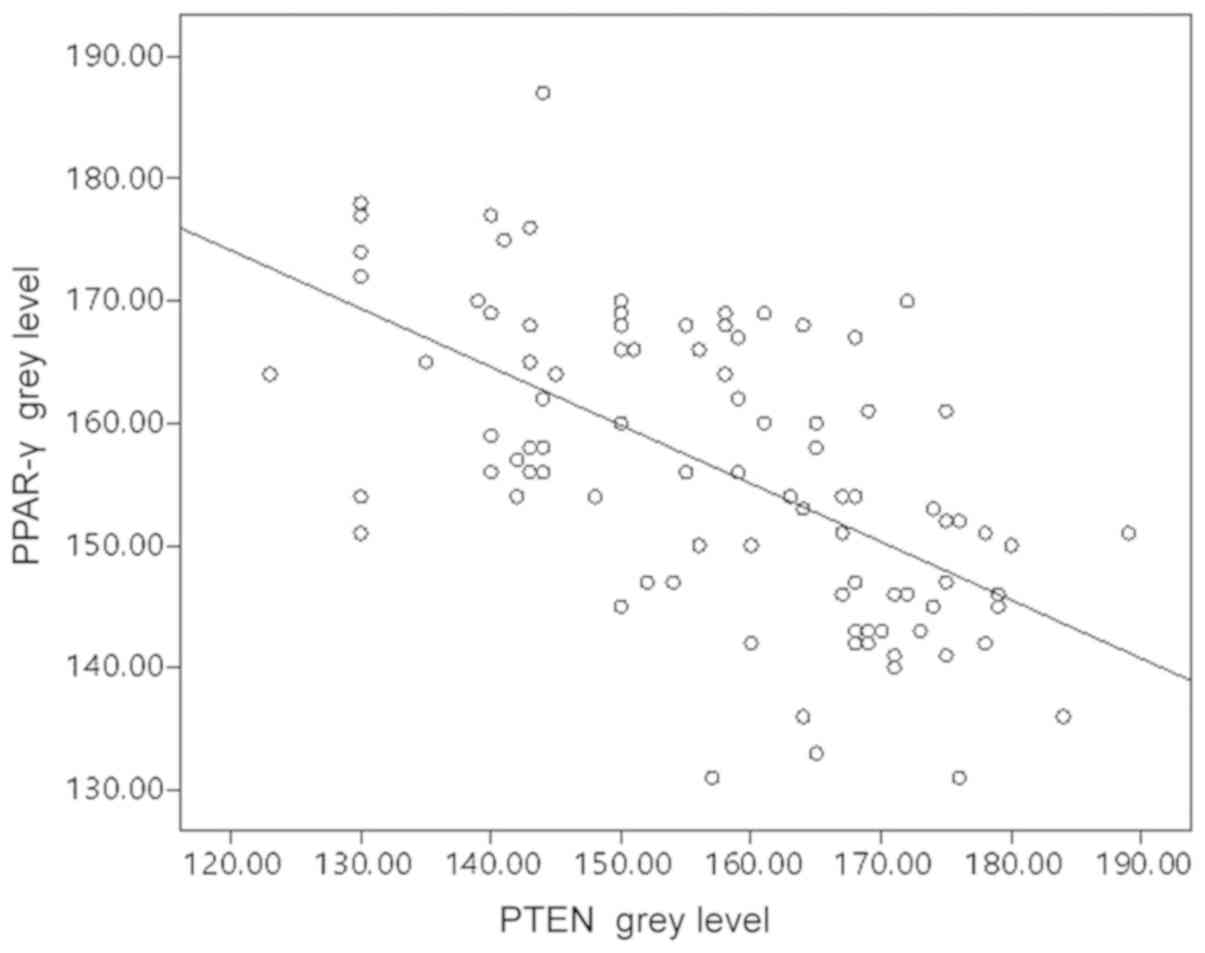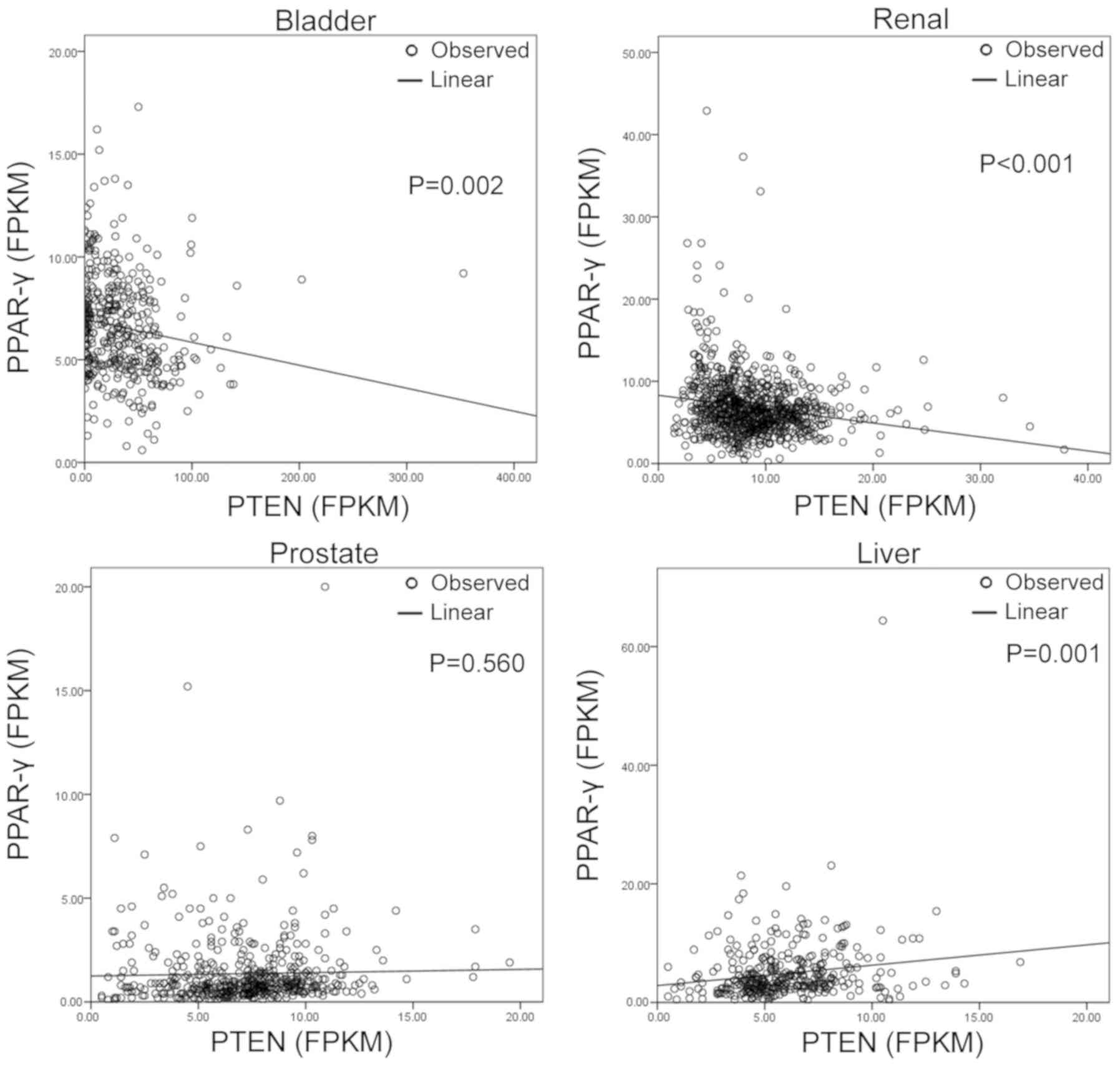|
1
|
Siegel RL, Miller KD and Jemal A: Cancer
statistics, 2016. CA Cancer J Clin. 66:7–30. 2016. View Article : Google Scholar : PubMed/NCBI
|
|
2
|
Babjuk M, Burger M, Zigeuner R, Shariat
SF, van Rhijn BW, Comperat E, Sylvester RJ, Kaasinen E, Böhle A,
Palou Redorta J, et al: EAU guidelines on non-muscle-invasive
urothelial carcinoma of the bladder: Update 2013. Eur Urol.
64:639–653. 2013. View Article : Google Scholar : PubMed/NCBI
|
|
3
|
Strand DW, DeGraff DJ, Jiang M, Sameni M,
Franco OE, Love HD, Hayward WJ, Lin-Tsai O, Wang AY, Cates JM, et
al: Deficiency in metabolic regulators PPARgamma and PTEN
cooperates to drive keratinizing squamous metaplasia in novel
models of human tissue regeneration. Am J Pathol. 182:449–459.
2013. View Article : Google Scholar : PubMed/NCBI
|
|
4
|
Aboseif S, El-Sakka A, Young P and Cunha
G: Mesenchymal reprogramming of adult human epithelial
differentiation. Differentiation. 65:113–118. 1999. View Article : Google Scholar : PubMed/NCBI
|
|
5
|
Li Y, Liu W, Hayward SW, Cunha GR and
Baskin LS: Plasticity of the urothelial phenotype: Effects of
gastro-intestinal mesenchyme/stroma and implications for urinary
tract reconstruction. Differentiation. 66:126–135. 2000. View Article : Google Scholar : PubMed/NCBI
|
|
6
|
Castillo-Martin M, Domingo-Domenech J,
Karni-Schmidt O, Matos T and Cordon-Cardo C: Molecular pathways of
urothelial development and bladder tumorigenesis. Urol Oncol.
28:401–408. 2010. View Article : Google Scholar : PubMed/NCBI
|
|
7
|
Michalik L, Auwerx J, Berger JP,
Chatterjee VK, Glass CK, Gonzalez FJ, Grimaldi PA, Kadowaki T,
Lazar MA, O'Rahilly S, et al: International union of pharmacology.
LXI. peroxisome proliferator-activated receptors. Pharmacol Rev.
58:726–741. 2006. View Article : Google Scholar : PubMed/NCBI
|
|
8
|
Krishnan A, Nair SA and Pillai MR: Biology
of PPAR gamma in cancer: A critical review on existing lacunae.
Curr Mol Med. 7:532–540. 2007. View Article : Google Scholar : PubMed/NCBI
|
|
9
|
Platt FM, Hurst CD, Taylor CF, Gregory WM,
Harnden P and Knowles MA: Spectrum of phosphatidylinositol 3-kinase
pathway gene alterations in bladder cancer. Clin Cancer Res.
15:6008–617. 2009. View Article : Google Scholar : PubMed/NCBI
|
|
10
|
Dormandy JA, Charbonnel B, Eckland DJ,
Erdmann E, Massi-Benedetti M, Moules IK, Skene AM, Tan MH, Lefèbvre
PJ, Murray GD, et al: Secondary prevention of macrovascular events
in patients with type 2 diabetes in the PROactive Study
(PROspective pioglitAzone Clinical Trial In macroVascular Events):
A randomised controlled trial. Lancet. 366:1279–1289. 2005.
View Article : Google Scholar : PubMed/NCBI
|
|
11
|
Montironi R and Lopez-Beltran A: The 2004
WHO classification of bladder tumors: A summary and commentary. Int
J Surg Pathol. 13:143–153. 2005. View Article : Google Scholar : PubMed/NCBI
|
|
12
|
Francisco JS, Moraes HP and Dias EP:
Evaluation of the Image-Pro Plus 4.5 software for automatic
counting of labeled nuclei by PCNA immunohistochemistry. Braz Oral
Res. 18:100–1004. 2004. View Article : Google Scholar : PubMed/NCBI
|
|
13
|
Lin MS, Huang JX, Chen WC, Zhang BF, Fang
J, Zhou Q, Hu Y and Gao HJ: Expression of PPARgamma and PTEN in
human colorectal cancer: An immunohistochemical study using tissue
microarray methodology. Oncol Lett. 2:1219–1224. 2011. View Article : Google Scholar : PubMed/NCBI
|
|
14
|
Zhu C, Wei J, Tian X, Li Y and Li X:
Prognostic role of PPAR-gamma and PTEN in the renal cell carcinoma.
Int J Clin Exp Pathol. 8:12668–12677. 2015.PubMed/NCBI
|
|
15
|
Chalasani V, Chin JL and Izawa JI:
Histologic variants of urothelial bladder cancer and nonurothelial
histology in bladder cancer. Can Urol Assoc J. 3:S193–S198. 2009.
View Article : Google Scholar : PubMed/NCBI
|
|
16
|
Walid MS and Heaton RL: Can
posthysterectomy cystoscopy be utilized as a screening test for
bladder cancer? Ger Med Sci. 6:132008.
|
|
17
|
Lotan Y and Roehrborn CG: Sensitivity and
specificity of commonly available bladder tumor markers versus
cytology: Results of a comprehensive literature review and
meta-analyses. Urology. 61:109–118. 2003. View Article : Google Scholar : PubMed/NCBI
|
|
18
|
Forootan FS, Forootan SS, Malki MI, Chen
D, Li G, Lin K, Rudland PS, Foster CS and Ke Y: The expression of
C-FABP and PPARgamma and their prognostic significance in prostate
cancer. Int J Oncol. 44:265–275. 2014. View Article : Google Scholar : PubMed/NCBI
|
|
19
|
Fuentes E, Guzman-Jofre L, Moore-Carrasco
R and Palomo I: Role of PPARs in inflammatory processes associated
with metabolic syndrome (Review). Mol Med Rep. 8:1611–1616. 2013.
View Article : Google Scholar : PubMed/NCBI
|
|
20
|
Lee C, Ramirez JA, Guitart J and Diaz LK:
Expression of cyclooxygenase-2 and peroxisome
proliferator-activated receptor gamma during malignant melanoma
progression. J Cutan Pathol. 35:989–994. 2008. View Article : Google Scholar : PubMed/NCBI
|
|
21
|
Yoshimura R, Matsuyama M, Segawa Y, Hase
T, Mitsuhashi M, Tsuchida K, Wada S, Kawahito Y, Sano H and
Nakatani T: Expression of peroxisome proliferator-activated
receptors (PPARs) in human urinary bladder carcinoma and growth
inhibition by its agonists. Int J Cancer. 104:597–602. 2003.
View Article : Google Scholar : PubMed/NCBI
|
|
22
|
Li MY, Yuan H, Ma LT, Kong AW, Hsin MK,
Yip JH, Underwood MJ and Chen GG: Roles of peroxisome
proliferator-activated receptor-alpha and -gamma in the development
of non-small cell lung cancer. Am J Respir Cell Mol Biol.
43:674–683. 2010. View Article : Google Scholar : PubMed/NCBI
|
|
23
|
Sullivan PF, Pedersen NL, Jacks A and
Evengard B: Chronic fatigue in a population sample: Definitions and
heterogeneity. Psychol Med. 35:1337–1348. 2005. View Article : Google Scholar : PubMed/NCBI
|
|
24
|
Song MS, Salmena L and Pandolfi PP: The
functions and regulation of the PTEN tumour suppressor. Nat Rev Mol
Cell Biol. 13:283–296. 2012. View
Article : Google Scholar : PubMed/NCBI
|
|
25
|
Jiang BH and Liu LZ: PI3K/PTEN signaling
in angiogenesis and tumorigenesis. Adv Cancer Res. 102:19–65. 2009.
View Article : Google Scholar : PubMed/NCBI
|
|
26
|
Edfors F, Danielsson F, Hallstrom BM, Kall
L, Lundberg E, Ponten F, Forsström B and Uhlén M: Gene-specific
correlation of RNA and protein levels in human cells and tissues.
Mol Syst Biol. 12:8832016. View Article : Google Scholar : PubMed/NCBI
|
|
27
|
Greenbaum D, Colangelo C, Williams K and
Gerstein M: Comparing protein abundance and mRNA expression levels
on a genomic scale. Genome Biol. 4:1172003. View Article : Google Scholar : PubMed/NCBI
|
|
28
|
Langle Y, Lodillinsky C, Belgorosky D,
Sandes EO and Eijan AM: Role of peroxisome proliferator activated
receptor-gamma in bacillus Calmette-Guerin bladder cancer therapy.
J Urol. 188:2384–2390. 2012. View Article : Google Scholar : PubMed/NCBI
|


















